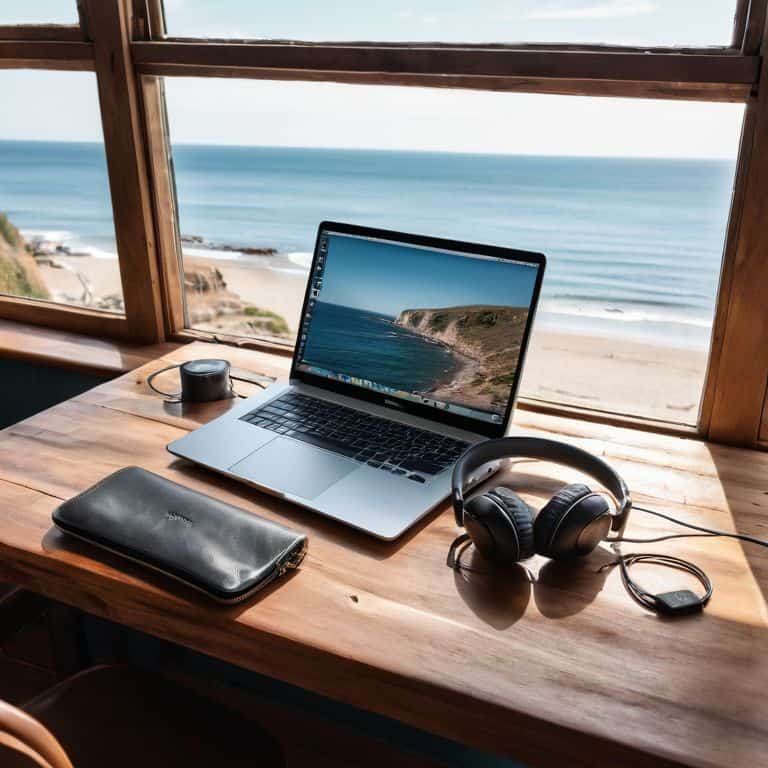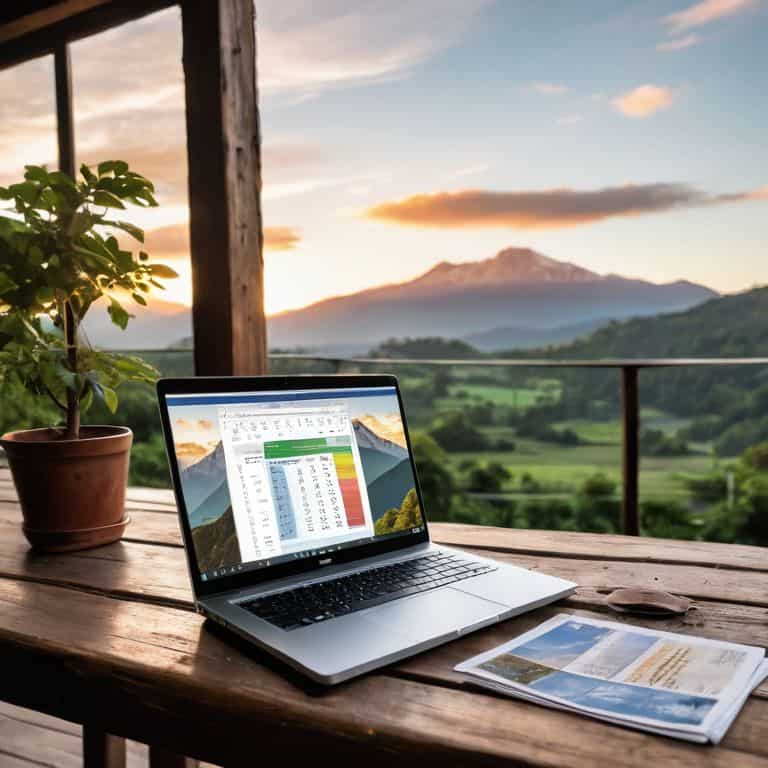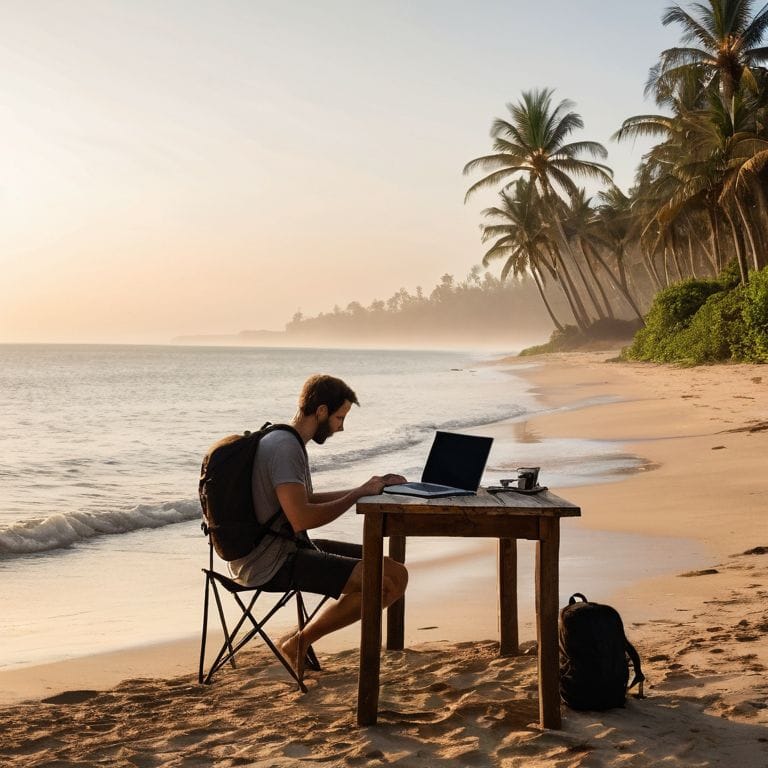I still remember the frustration of trying to find the best laptops for travel that could keep up with my nomadic lifestyle. I’ve been a digital nomad for over a decade, and I’ve learned that having the right gear can make all the difference between productivity and disaster. When I first started out, I thought that any laptop would do, but quickly realized that portability and functionality are key to getting work done on the road.
As someone who’s been around the block a few times, I’m tired of the fluff and clichés that flood the internet when it comes to travel gear. That’s why I’m cutting through the noise to give you the lowdown on what really works. In this article, I’ll share my honest, experience-based advice on how to choose a laptop that can handle the demands of life as a digital nomad. I’ll give you the no-BS truth about what to look for, what to avoid, and how to make the most of your investment. Whether you’re a seasoned traveler or just starting out, I’ll provide you with the practical insights you need to make an informed decision and find the best laptop for your travels.
Table of Contents
Best Laptops for Travel

A best laptop for travel is a portable computer designed to provide users with a reliable and efficient way to work and stay connected on the go, with its main selling point being the combination of lightweight design and long battery life. This allows travelers to stay productive and entertained without being weighed down by bulky devices. The best laptops for travel typically feature powerful processors, ample storage, and high-resolution displays, making them ideal for both work and play.
As someone who’s spent years working as a digital nomad, I can attest to the importance of having a laptop that can keep up with your active lifestyle. I’ve lost count of how many times I’ve found myself working from a coffee shop or co-working space in a foreign city, and having a laptop that’s both powerful and portable has been a game-changer. Whether you’re a travel blogger, a remote worker, or simply someone who loves to stay connected on the go, a best laptop for travel is an essential tool that can help you stay productive and focused, even in the most unlikely of locations.
Portable Computers for Work and Play

A portable computer for work and play is a device that balances performance and portability, allowing users to seamlessly switch between work and leisure activities. Its core mechanism is based on a combination of processor speed, memory, and storage, which enables users to run multiple applications simultaneously and enjoy smooth multimedia playback. The main selling point of portable computers for work and play is their ability to provide an all-in-one solution for users who need a device that can handle both productivity tasks and entertainment.
In my experience, a portable computer for work and play is not just a nice-to-have, but a must-have for anyone who wants to make the most of their time on the road. Whether you’re working on a project, video editing, or simply streaming your favorite shows, a portable computer for work and play can help you stay entertained and productive, even in the most remote locations. By having a device that can handle both work and play, you can maximize your downtime and make the most of your travels, which is essential for anyone who wants to maintain a healthy work-life balance while on the move.
Head-to-Head Comparison of Best Laptops for Travel
| Feature | Dell XPS 13 | Apple MacBook Air | Lenovo ThinkPad X1 Carbon | HP Envy 13 | Asus ZenBook 13 | Microsoft Surface Laptop 3 | Acer Swift 5 |
|---|---|---|---|---|---|---|---|
| Price | $999 | $999 | $1,331 | $799 | $699 | $999 | $699 |
| Weight | 2.75 lbs | 2.75 lbs | 2.4 lbs | 2.87 lbs | 2.62 lbs | 2.76 lbs | 2.19 lbs |
| Key Feature | InfinityEdge Display | Retina Display | ThinkPad Keyboard | Fingerprint Reader | NanoEdge Display | PixelSense Display | Fingerprint Reader |
| Best For | General Use | Creative Pros | Business | Students | Travelers | General Use | Everyday Tasks |
| Battery Life | 12 hours | 12 hours | 15 hours | 14 hours | 14 hours | 11.5 hours | 12 hours |
| Processor | 10th Gen Intel Core i5 | 10th Gen Intel Core i3 | 8th Gen Intel Core i5 | 10th Gen Intel Core i5 | 10th Gen Intel Core i3 | 10th Gen Intel Core i5 | 10th Gen Intel Core i5 |
| Storage | 256GB SSD | 256GB SSD | 512GB SSD | 256GB SSD | 256GB SSD | 256GB SSD | 512GB SSD |
Best Laptops for Travel
When it comes to best laptops for travel, the criterion of portability is crucial. As a digital nomad, I’ve learned that a laptop that’s too heavy or bulky can be a major hindrance to productivity on the go. I’ve had my fair share of experiences where I’ve had to lug around a heavy laptop, only to find myself stuck in a crowded coffee shop with no outlet in sight.
In a head-to-head analysis, laptops like the MacBook Air and the Dell XPS 13 are often compared for their portability. The MacBook Air is known for its slim design and lightweight construction, making it easy to slip into a backpack or purse. On the other hand, the Dell XPS 13 is also incredibly compact, with a small footprint that makes it perfect for working in small spaces.
However, when it comes to portability, I have to give the edge to the MacBook Air. Its long battery life and lightweight design make it the perfect companion for long trips or extended periods of work on the go. Overall, the MacBook Air is the clear winner in this category, offering the perfect blend of power and portability for digital nomads like myself.
Key Takeaways for Fearless Digital Nomads
Ditch the heavy gear: opt for laptops that weigh under 3 pounds to save your back and increase productivity on-the-go
Processor power isn’t everything: consider laptops with long battery life, ample storage, and sturdy construction to withstand the rigors of constant travel
Your laptop is only as good as its ports: prioritize devices with multiple USB ports, an SD card slot, and an HDMI output to stay connected and get work done in even the most remote locations
The Digital Nomad's Verdict
A good laptop for travel isn’t just about specs and price; it’s about finding a trusted sidekick that can keep up with your spontaneous detours, cramped hostel desks, and endless coffee shop hopping – because let’s face it, the real work happens in the in-betweens.
Clara Bishop
The Final Verdict: Which Laptop Should You Choose?

After comparing the top laptops for travel, it’s clear that each has its own strengths and weaknesses. Some excel in portability, while others offer raw power for demanding tasks. The key to choosing the right one lies in understanding your specific needs as a digital nomad. If you’re always on the move, a lightweight laptop with a long battery life might be your best bet. On the other hand, if you’re a heavy user who needs to run multiple applications simultaneously, a more powerful machine might be necessary.
Ultimately, the overall winner is the laptop that strikes the perfect balance between performance and practicality. For most digital nomads, I’d recommend the Dell XPS 13 – it’s a great all-around choice that offers excellent performance, a stunning display, and a compact design. However, if you’re a heavy user who prioritizes processing power, the MacBook Pro might be a better fit. Meanwhile, budget-conscious travelers may find that the Acer Aspire 5 offers the best value for money, making it an excellent choice for those on a tight budget.
Frequently Asked Questions
What are the most important factors to consider when choosing a laptop for travel?
For me, it’s all about portability, battery life, and durability. I need a laptop that can withstand the rigors of constant travel, won’t weigh me down, and can keep up with my work demands on the go.
How do I balance portability with processing power when selecting a travel laptop?
For me, it’s all about finding that sweet spot between weight and horsepower. I need a laptop that can handle video editing and writing on the go, but won’t weigh me down. I’ve found that a 13-14 inch screen with an Intel Core i5 or i7 processor is the perfect compromise – it’s lightweight, powerful, and gets the job done.
Are there any specific laptop features that can help prevent data loss or security breaches while working remotely on the road?
Honestly, data security is a top concern for digital nomads. Look for laptops with built-in encryption, biometric login, and a trusted platform module (TPM) to safeguard your files. I also swear by cloud backup and a portable hard drive for extra peace of mind.
